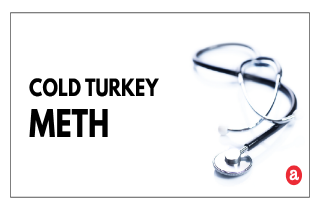Going cold turkey meth?
Stopping use of methamphetamine without any help or formal treatment plan is often called “cold turkey”, a phrase borrowed from heroin addiction. This type of cessation is often linked to different reasons to stop, such as having a new social role or loss of finances. But is it safe? And what are the signs of withdrawal from meth in the first place?
We explore more here. Then, we invite your questions or experiences about getting off meth and starting addiction recovery. Please contact us via the comments section at the end. We try to respond to all legitimate questions personally and promptly.
Cold turkey meth withdrawal: What is it?
The cold turkey method involves the meth user quitting the drug totally and all at once. This is the most difficult case for the user and they will likely undergo the most extreme withdrawal symptoms. While someone is withdrawing from meth, s/he may have difficulty acting normally or rationally. Depressive and psychotic symptoms can accompany acute withdrawal from methamphetamine but generally resolve within 1 week. Craving is also present and lasts at least 5 weeks. The cold turkey method can be very difficult, but if completed successfully, an addict can continue with psychological treatment for the underlying reasons behind meth use.
Cold turkey off meth
Meth withdrawal is very different from other types of drug withdrawal because many of the issues are psychological rather than physical. Meth withdrawal often causes severe depression; chronic meth use alters the brain chemistry, specifically the neurotransmitters which control enjoyment. Often, people who come off meth cannot experience pleasure in life. This state is called “anhedonia”, and while it is not permanent, it is one of the major reasons why you need medical supervision during withdrawal.
In other words, the chance of relapse during meth withdrawal is very high because you can’t stand the way you FEEL. In order to successfully stop using, addicts should seek support from other people who have gone through the exact same process OR from medical professionals trained in treating psychological symptoms. Going cold turkey off meth by yourself without help can lead to relapse, or to symptoms of severe mood disorders.
Stopping meth cold turkey risks
While meth is not physically addictive (does not cause many symptoms of physical dependence), psychological withdrawal symptoms can be present and severe. A person coming off meth can feel extremely, horribly depressed for awhile, and their brain will crave a meth high to make them feel better again. A former meth user will also probably sleep a lot (both because they haven’t been sleeping enough for awhile and because they’re so depressed, and sleep is an escape) and they may also eat a lot, both because they haven’t been eating enough for awhile, and because they are using food as a replacement drug.
The main risks of stopping meth cold turkey include:
- extreme drug craving
- feelings of hopelessness
- psychotic symptoms
- relapse potential high
- suicidal ideation
Alternatives to quitting meth cold turkey: Tapering
How can you help a meth addict get through withdrawal? Quitting “cold turkey” is not for everyone. Instead, tapering doses can help minimize the severity and intensity of withdrawal symptoms. Sometimes experts recommend that you try cutting back your use in steps. Use twice a week instead of every day, or twice a month instead of every weekend. You can also cut down on how much you use. Use 1/4 gram instead of 1/2, or use 1/8 instead of 1/4. This can help with withdrawal as well!
Getting off meth for good
Trying to quit meth cold turkey on your own with no emotional support is not likely to be successful. Instead, doctors recommend that you seek supportive medical interventions during acute detoxification and withdrawal, as these are effective. Ongoing psychiatric care with antidepressant drug therapy may be effective in recovery, and treatment needs to be longer than traditional alcohol/drug treatment programs. The user’s thinking, expectancies and behaviors need to be modified to increase skills in dealing with life. Go to meetings and find people to help who can support you as you to move past your meth addiction.
If you suspect that you or someone close to you has developed dependence or addiction to meth, seek medical help to quit! Detox and withdrawal can be dangerous and lead to relapse if you try to quit cold turkey and on your own. Also, learn more about the addiction treatment process and available options for rehab in our Methamphetamine Addiction Treatment Programs and Help GUIDE for safe and successful quitting.
Can I quit meth cold turkey?
While it is possible to quit meth cold turkey, it is not recommended. If you do it alone it is VERY likely that you will relapse and have to go through the whole process again.
If you`re interested in finding out more about treating meth addiction, please ask your question at the bottom of the page. Hopefully, we can find the information you’re looking for as soon as possible.









Related Posts